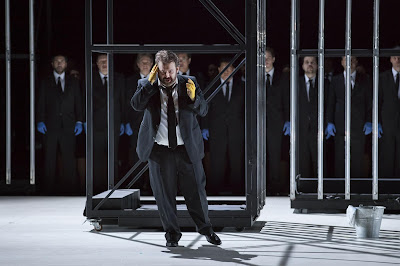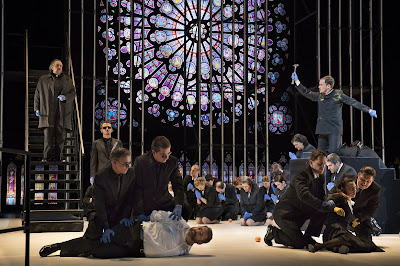 |
| Halévy:La Juive - Roy Cornelius Smith, Corinne Winters - Opera Vlaanderen (Photo Annemie Augustijns) |
Reviewed by Robert Hugill on 10 March 2019
Star rating: (★★★★★)
Revival of a riveting contemporary production which creates a remarkably focused, intent drama
 |
| Halévy:La Juive - Corinne Winters Opera Vlaanderen (Photo Annemie Augustijns) |
For all its emphasis on grand theatrical effects and visual drama, there was a remarkable vein of politics in French Grand Opera of the 1830s and 1840s. Both Meyebeer's Les Huguenots (1836) and Le Prophète (1849) examine political discord through the mirror of religion, whilst Halévy's La Juive (1835) places Christian intolerance of the Jews firmly at its centre. There is some discussion amongst commentators about quite how contemporary audiences saw the opera, and whether the role of Eléazar is too much a caricature. But Eléazar and his daughter Rachel (the Jewess of the title) are at the centre of the drama, and were played by two of the biggest stars of the Paris opera, Adolphe Nourrit and Cornelie Falcon.
 |
| Halévy:La Juive - Roy Cornelius Smith Opera Vlaanderen (Photo Annemie Augustijns) |
This sort of meta-theatre was central to Konwitschny's concept. After Léopold (Enea Scala) made the revelation of his Christianity he pleaded with Rachel (Corinne Winters) in a typically operatic-theatrical fashion, but Konwitschny brought Winters into the auditorium and she registered emotions in a far more naturalistic way, mocking Léopold's over the top emoting. And similarly in the opera's hit number, 'Rachel, quand au Seigneur', Roy Cornelius Smith's Eléazar came out into the audience, a father pleading for his daughter, leaving the stage to the over the top drama of the Christian chorus. Konwitschny made us both takes sides and step out of the drama.
He used little in the way of religious symbolism, even the huge stained glass window which was a feature of the set could be read two ways, made for a Christian church yet the stories told in the quasi-Medieval glass are often part of the Jewish religious narrative.
 |
| Halévy:La Juive - Nicole Chevalier, Roy Cornelius Smith, Enea Scala Opera Vlaanderen (Photo Annemie Augustijns) |
Central to the drama was the chorus, a remarkable performance, these were clearly fanatics and took their persecution to mob violence limits, but included mockery in their armory too. Vocally the chorus gave a strong performance, uniting music and drama.
The French soprano Cornelie Falcon left French Grand Opera with a sequence of problem roles, in fact the term Falcon soprano is used to refer to this voice type, a soprano with a strong and even middle and lower register or a mezzo-soprano with a high extension. I had previously seen Corinne Winters as Violetta in Verdi's La traviata and Therese in Berlioz Benvenuto Cellini, yet nothing could have prepared me for the focused intensity of her performance as Rachel, and the remarkable strength and evenness of her middle and lower registers; the way she sang the whole role with a feeling of intensely projected line. This Rachel felt things deeply and conveyed it through the music. Konwitschny asked a lot of his Rachel, she turned suicide bomber in Act Three, but Winters certainly delivered and did so with the music, not despite it.
 |
| Halévy:La Juive - Opera Vlaanderen (Photo Annemie Augustijns) |
Perhaps Smith's approach to the music was a little too Verismo orientated, but he sang with power and commitment. I could imagine a more lyrical account of Eléazar's Act Four aria, but not one more deeply felt.
Nicole Chevalier's Princess Eudoxie was left pretty much as the original paints her, a flirty, flighty party girl, first seen swigging from a champagne bottle and misbehaving terrifically during her scene with Eléazar, yet getting away with it. As with Italian opera semi-seria, the production understood how a character could be comic and yet have the balance of power in a relationship. Chevalier sang brilliantly, throwing off the roulades with wicked abandon and perhaps showing a bit of spine as she misbehaves so.
There is little that can be done with the character of Léopold, the married Prince of the Empire who pretends to be a Jew in order to seduce Rachel, even going to the length of suggesting they run away together. The production left him as a self-indulgent, somewhat risible character, capable of convincing deception but lacking substance. Enea Scala had great fun with him, and was highly successful in depicting both the self-indulgence of the man and his sheer sexiness. Scala, an experience Rossinian, sang finely with strength and fluidity so you regretted that Léopold effectively disappeared in the second half of the opera.
Riccardo Zanellato was a fine Cardinal de Brogni, with sufficient stature both physically and vocally to hold the mob in check, yet prey to Eléazar's hints about the Cardinal's daughter and eventually falling apart in the last act.
Leon Kosavic made an impressive Ruggiero, effectively the leader of the Christian group. Kosavic gave a nice picture of a very focused bigot, unaware of his faults.
In the pit, Antonino Fogliani and the orchestra brought an impressive sweep to the music, creating the sort of depth that the score needs to keep it going, and moments like the long instrumental introduction to 'Rachel, quand au Seigneur' were beautifully done.
 |
| Halévy:La Juive - Opera Vlaanderen (Photo Annemie Augustijns) |
There are performances of La Juive at Opera Antwerp and Opera Ghent until 6 April 2019, see Opera Vlaanderen website for details.
Elsewhere on this blog:
- Claustrophobic & atmospheric: Verdi's Macbeth from English Touring Opera (★★★½) - opera review
- Letting the music speak for itself: Mozart's Idomeneo from English Touring Opera (★★★★½) - opera review
- Cadogan Hall debut: the Gesualdo Six in a programme of Renaissance and Contemporary (★★★★) - concert review
- The Children's Hour: intimate and delightfully casual, Gareth Brynmor John and William Vann at Pizza Express Live - concert review
- Haydn's The Seasons from Vladimir Jurowski and the London Philharmonic Orchestra (★★★★★) - concert review
- Virtuosity and intimacy: Flauguissimo duo's A Salon Opera (★★★½) - CD review
- Political piano and terrific technique: Adam Swayne's (speak to me): new music, new politics (★★★★★) - CD review
- Neapolitan revival: Rossini's Elizabeth in a rare staging from English Touring Opera - opera review
- Glitter and sparkle: The Merry Widow at English National Opera (★★★★) - opera review
- Creating a contemporary choral tradition in Ireland: Desmond Earley and The Choral Scholars of University College Dublin - interview
- Dame Emma Kirkby's 70th birthday concert at the Wigmore Hall (★★★★★) - concert review
- A very modern Robin Hood: Dani Howard's new opera at The Opera Story (★★★★) - opera review
- Home











Great review. Is there a reason you left Zanellato out of your mentions?
ReplyDeleteApologies, I managed to skip a paragraph when typing the review up, all corrected now.
Delete